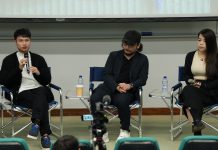While the pro-establishment camp may at times appear to blindly support the government, Lee says they have an important role to play and sometimes take similar lines to pan-democratic groups on certain socio-economic issues.
“When you compare the Democratic Party with the DAB, 80 to 90 per cent of their agendas are the same,” says Lee.
The Hong Kong Federation of Trade Unions (HKFTU) is a traditional pro-Beijing labour group. Despite the group’s pro-establishment tag, 35-year-old Kwok Wai-keung, who represents the HKFTU in the Legislative Council, says he will fight for labour rights. “In a society where the capitalists and workers are somehow confronting each other, you have to be aggressive about labour rights. You can see that we are quite aggressive on issues like standard working hours and paternity leave,” he says.
Kwok says he has to be outspoken in order to attract younger voters, but insists he will not go as far as some in the radical pan-democracy parties. “To be frank, we would not throw things. Rather, we try to create more platforms and space to express our opinions.”
Within the younger ranks of the DAB, Hong Kong’s biggest pro-Beijing political party, there are also signs of a departure from more traditional conservatism.
Chow Ho-ding, the chairman of Young DAB, describes himself as one of the very few people from the DAB to be considered outspoken. For the last three years or so, he has been a regular speaker on the RTHK current affairs programme, City Forum.
Chow says it is rare for people from the pro-establishment camp to take part in the programme. “People from the pro-establishment camp are unwilling to attend City Forum because there is a risk of saying something wrong and of causing problems for other people.”
Along with other members of Young DAB, Chow also writes newspaper columns. As he explains, these are hardly the shock tactics of some of the radical democrats or groups like Caring Hong Kong Power. “To be honest, our supporters would not want us to do radical things,” says Chow, “because our political ideology is rather conservative and we dislike expressing ourselves in eye-catching ways.”

Executive Council member Cheung Chi-kong, who is a pro-government commentator and executive director of the One Country Two Systems Research Institute, says he is not surprised the pro-establishment camp is borrowing some of the pan-democrats’ clothes.
“They are influencing each other. You can’t say you have a monopoly on the way some things are done. You could act in a certain way and I could respond in the same way. It’s like monkey see, monkey do.”
In the jostle to be heard in an increasingly political city, the pro-establishment camp is increasingly competing with opposition voices in more visible and animated ways. As they watch the radical pan-democrats gaining more young supporters, they are becoming more open to the outspoken style of their younger members.
Edited by Matthew Leung






































